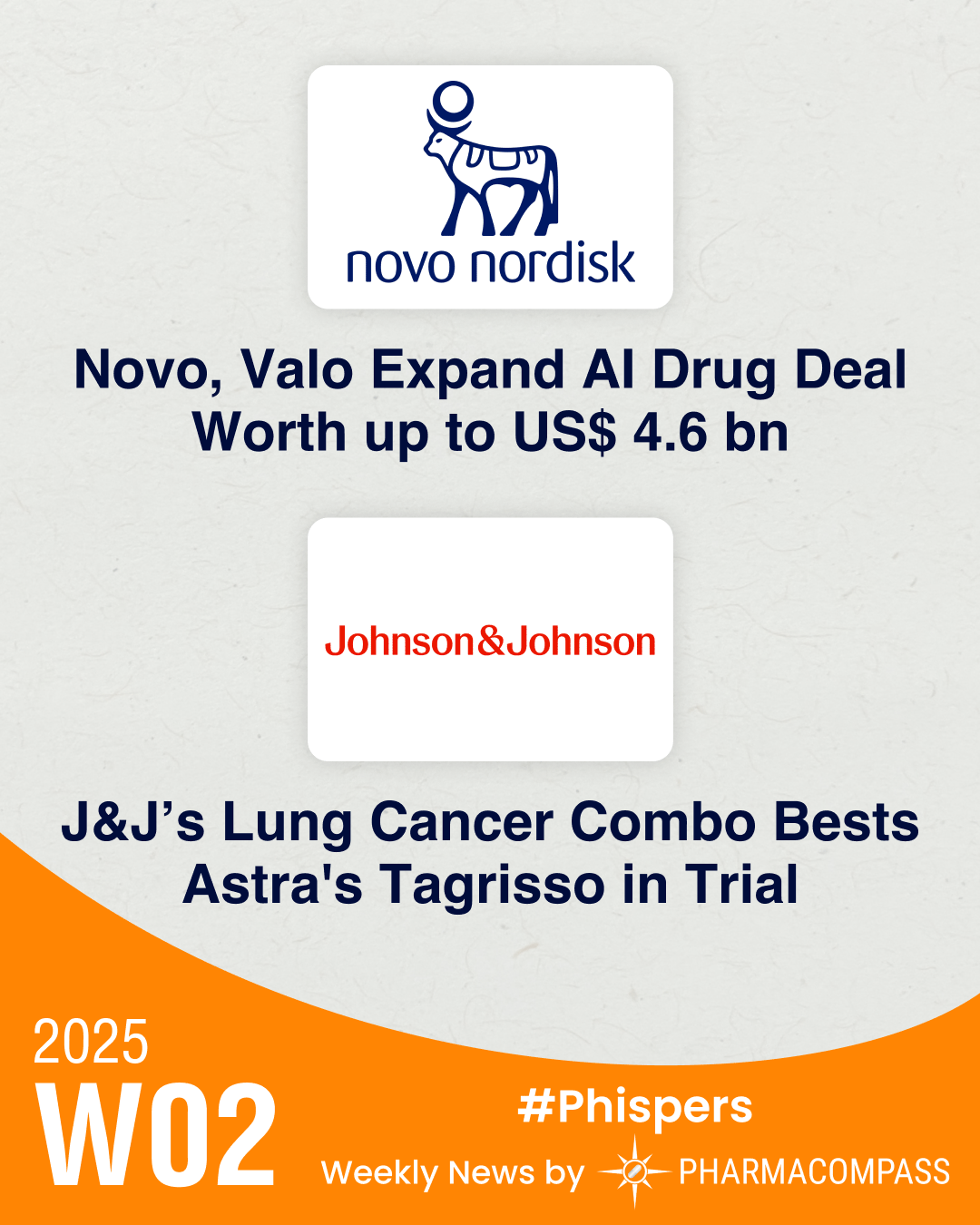
By PharmaCompass
2025-01-09
Impressions: 1,068 (Article) || 40 (Video)
As the embattled WuXi Biologics faces increasing pressure from the impending US Biosecure Act, it has decided to sell its vaccine manufacturing facility in Dundalk, Ireland, to Merck for € 500 million (US$ 521 million). Wuxi also struck a US$ 925 million deal with Candid Therapeutics for its tri-specific T-cell engager candidate.
In deals, Novo Nordisk and Valo Health expanded their existing AI-driven drug development partnership to discover and develop novel treatments for cardiometabolic diseases.
In oncology, J&J achieved a notable victory as its lung cancer combination therapy, which was approved last August by the US Food and Drug Administration (FDA), demonstrated superior survival benefits compared to AstraZeneca’s Tagrisso in a head-to-head study.
The week saw another disappointment in treating major depressive disorder as Neumora Therapeutics’ novel drug failed to meet its primary endpoint in a pivotal trial. Meanwhile Denali Therapeutics’ ALS candidate fell short in a late-stage trial.
On the regulatory front, FDA has mandated that GSK and Pfizer include warnings about the risk of Guillain-Barré syndrome (GBS), a rare neurological disorder, in the prescribing information for their RSV vaccines — Arexvy and Abrysvo.
WuXi Biologics sells Irish vaccine facility to Merck for US$ 521 mn
WuXi Biologics has agreed to sell its vaccine manufacturing facility in Dundalk, Ireland, to Merck (known as MSD outside US) for € 500 million (US$ 521 million). This transaction marks a strategic divestiture for WuXi Biologics, which has been facing increasing global pressure, particularly from the US Biosecure Act that targets Chinese biotech firms on national security grounds.
The US House of Representatives had passed the Biosecure Act in September, aiming to prohibit federal contracts with certain firms and their business partners. It had specifically mentioned WuXi. The Act still needs approval of the Senate, and the president’s approval to become law. Meanwhile, WuXi AppTec reached an agreement with US-based private equity firm Altaris last month to sell its US and UK-based cell and gene therapy operations.
Candid gains rights to WuXi’s T-cell engager in US$ 925 mn deal: Candid Therapeutics has entered into an agreement with WuXi Biologics to acquire exclusive global rights to a trispecific T-cell engager. This preclinical candidate, developed using WuXi's WuXiBody platform, aims to advance treatments for autoimmune and inflammatory diseases. The deal, valued at up to US$ 925 million, includes an upfront payment, development, and sales milestones.
J&J’s lung cancer combo keeps patients alive a year longer than Astra’s Tagrisso in head-to-head study
Johnson & Johnson said its lung cancer drug combination, Rybrevant (amivantamab-vmjw) and Lazcluze (lazertinib), keeps patients alive for at least a year longer than those treated with the current standard of care – AstraZeneca’s Tagrisso (osimertinib). J&J executives hailed the result as a game-changer. J&J is aiming to supplant Astra’s blockbuster Tagrisso, a once-daily pill that has revolutionized the treatment of non-small cell lung cancer (NSCLC) with EGFR mutations, extending median survival to about three years. These genetic mutations cause cancer cells to proliferate and are responsible for 10 to 15 percent of lung cancer cases in the US, according to the American Lung Association.
Novo, Valo Health expand AI-driven drug development partnership in US$ 4.6 bn deal
Novo Nordisk and Valo Health have announced an expansion of their collaboration to discover and develop novel treatments for cardiometabolic diseases, including obesity, type 2 diabetes, and cardiovascular disease. The collaboration aims to harness the power of artificial intelligence and extensive human datasets, and builds on their initial 2023 partnership. It will enable the development of up to 20 drug programs. Valo will receive up to US$ 190 million in near-term payments, with the potential for milestone payments totaling approximately US$ 4.6 billion, plus R&D funding and potential royalty payments.
Neumora’s novel depression drug flops in pivotal late-stage trial, adding to MDD setbacks
Neumora Therapeutics suffered a setback with its experimental depression drug, navacaprant. In the first of three pivotal phase 3 trials, the drug failed to reduce symptoms such as sadness and pessimistic thoughts, raising concerns over its future development. The study in adults with major depressive disorder (MDD) showed that navacaprant did not significantly outperform a placebo in alleviating depressive symptoms. Neumora called the outcome “disappointing” as it had previously seen promising results in smaller studies.
Last month, Relmada scrapped two late-stage trials of its MDD drug after an independent data monitoring committee called the effort “futile”. In 2023, Biogen and Sage’s Zurzuvae (zuranolone) gained FDA approval for postpartum depression but was rejected for MDD.
Another Denali ALS candidate fails in late-stage: Denali Therapeutics’ experimental drug, DNL343, to treat the fatal neurodegenerative disease amyotrophic lateral sclerosis (ALS) has failed to meet the primary and key secondary endpoints of a mid-to-late stage trial. The trial’s primary endpoint was to measure changes in disease severity and survival over 24 weeks, but the drug did not show significant improvements. Key secondary endpoints included meaningful improvements in muscle strength and respiratory function. Last year, Denali’s other ALS candidate had failed.
GSK, Pfizer’s RSV jabs must warn about risk of rare paralysis disorder, says FDA
FDA has mandated that GSK and Pfizer include warnings about the risk of Guillain-Barré syndrome (GBS), a rare neurological disorder, in the prescribing information for their respiratory syncytial virus (RSV) vaccines, Arexvy and Abrysvo. GBS, where the body’s immune system attacks its own nerves, can cause muscle weakness and potentially lead to paralysis. FDA’s analysis found an estimated nine excess cases of GBS per million doses of Abrysvo and seven excess cases per million doses of Arexvy in individuals aged 65 and older. While the data suggests an increased risk, there isn't enough evidence to definitively tie the vaccines as the cause of the condition. The risks flagged in the prescribing information were not the regulator’s strictest “boxed” warnings.
Galapagos to split into two, spinning off innovative medicines business
Galapagos is splitting into two distinct publicly traded entities. The first entity, which will retain the Galapagos name, will focus on advancing its cell therapy programs in oncology, addressing critical unmet medical needs. The second entity will concentrate on developing a pipeline of innovative medicines through strategic transactions. The new entity will be capitalized with approximately € 2.45 billion (US$ 2.53 billion) from Galapagos’ current cash reserves. As part of this reorganization, Galapagos and Gilead Sciences have amended their 10-year agreement.
The PharmaCompass Newsletter – Sign Up, Stay Ahead
Feedback, help us to improve. Click here
Image Credit : Phisper Infographic by PharmaCompass license under CC BY 2.0
“ The article is based on the information available in public and which the author believes to be true. The author is not disseminating any information, which the author believes or knows, is confidential or in conflict with the privacy of any person. The views expressed or information supplied through this article is mere opinion and observation of the author. The author does not intend to defame, insult or, cause loss or damage to anyone, in any manner, through this article.”







